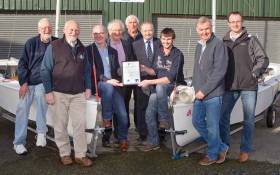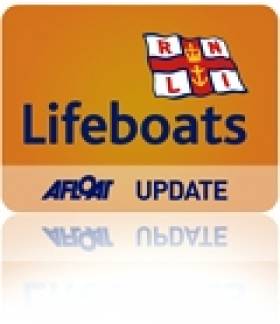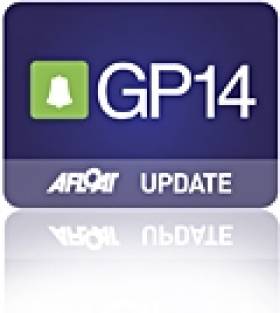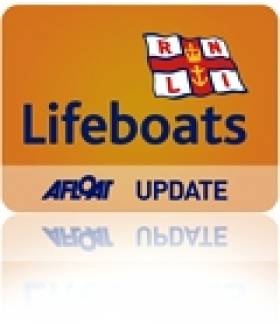Displaying items by tag: Newtownards Sailing Club
Josh Porter, Newtownards Sailing Club GP14 Fleet Captain, is the first recipient of a Richard Estaugh Bursary.
The 'Richard Estaugh Fund' was established from the sale of GP14 14000 which was donated by the late Richard Estaugh. Richard was not only a much respected sail-maker, boat-builder and multiple championship winner, but also a truly great ambassador for the sport of Sailing and the GP14 Class in particular. The fund was created in perpetual memory of Richard and the huge contribution that he made to the GP Class.
The Bursary is aimed in particular at young sailors from the GP14 International class but any GP sailor can apply for assistance from the fund to go towards the cost of worthwhile sailing related projects. These can take many forms such as participation in training/coaching programmes, championship campaigns, a cruising challenge or sailing expedition, providing assistance or ‘buddying’ for people with a disadvantage or disability.
Although Josh has been awarded the bursary to go towards his campaign at the UK National GP14 Championship in Cornwall this year he is also heavily involved in promoting the GP class in the area as Newtownards Fleet Captain. The Ballyhalbert youth helps extensively with training at NSC and with maintaining the Club's GP14 boats which assist newcomers to the sport to get an opportunity to sail without the expense of buying a boat.
RNLI Crews Assist Windsurfer, Stricken Fishing Boat in Co Down
#RNLI - Portaferry RNLI rescued a windsurfer who got into difficulty off the Co Down coast yesterday (16 April).
The volunteer crew launched their inshore lifeboat before 5pm yesterday evening to go the aid of the injured windsurfer reported to be in the area of Pig Island, a small island in Strangford Lough close to Newtownards Sailing Club.
The weather at the time was described as blowing slight to moderate winds with good visibility.
The crew was on scene at 5.15pm where they found the man on Pig Island accompanied by two other men. The windsurfer, who was suffering from a shoulder injury, was transferred to the lifeboat and made comfortable before being taken to the sailing club, where he was then transferred into the care of the coastguard and passed to the ambulance service to be taken to hospital.
Speaking after the rescue, Portaferry RNLI lifeboat operations manager Brian Bailie said: "As the charity that saves lives at sea, we will always respond to any call for help where someone is in danger.
"Strangford Lough is a popular destination for a wide range of water sport enthusiasts and it is important that they take all necessary precautions when using the lough.
"As we are all aware, accidents can and do happen and it is at such times that the work carried out by the volunteer crews of the RNLI is so important."
Elsewhere in Co Down yesterday, Bangor and Donaghadee RNLI assisted a fisherman whose 28ft commercial fishing boat experienced engine failure.
The crew quickly located the disabled boat one mile west of the Copeland Islands at the mouth of Belfast Lough yesterday morning after 11.15am.
With the vessel drifting closer to the island shores and the wind gusting gale force eight, a tow line was quickly rigged and passed to the fishing boat. Bangor RNLI was escorted by Donaghadee RNLI's all-weather lifeboat as it towed the fishing vessel to the safety of Bangor Harbour.
Bangor RNLI volunteer helm Peter Scott, who was involved in this rescue, said: "Engine failure close to shore could lead to a life threatening situation. We always urge everyone going to sea to make sure their electrical systems and engine are well maintained and in good working order. A good anchor and chain should always be carried as part of essential safety equipment.
"We are glad the skipper of this vessel is now safely ashore," he added.
Newtownards To Host RYANI Instructor and Coach Conference
#RYANI - Newtownards Sailing Club will be hosting this year’s Royal Yachting Association Northern Ireland (RYANI) Instructor and Coach Conference.
The conference on Saturday 16 February is aimed at RTC principals, RYA instructors and Volvo Champion Club coaches and co-ordinators.
Topics to be covered include Racing Rules of Sailing rule changes for 2013-2018 and a national update on activity by the RYA throughout the year.
The event also has an allowance for on-the-water activities, with a chance to pick up some new ideas for training in sailing and powerboating in the afternoon.
Meanwhile, Sunday 17 February will see various courses taking place throughout the day, including in first aid and SRC/VHF certification, as well as a club mark laying course for RYA members.
This half-theory, half-practical course will give an introduction to mark-laying which includes basics like how an anchor works plus techniques to stream marks, lay level gate marks and spreader marks, and a short section on signalling.
Details on booking your place at the Saturday conference and on the Sunday courses are available at the RYANI website HERE.
Inquest Hears Man Drowned After Dinghy Capsized
Two children looked on in horror as their father tried to save a drowning man, an inquest has heard in Belfast.
As the Belfast Telegraph reports, the family and a friend were thrown into Strangford Lough when their dinghy capsized some 500 yards from Newtownards Sailing Club on 12 June last year.
David Allen managed to pull his friend Ken Dorman to safety and performed mouth-to-mouth resuscitation while still in the water.
But Dorman, 51, had been shocked by the cold water and swallowed some, which caused him to drown, ruled coroner John Leckey.
Allen described his friend as strong and a good swimmer, and told of his shock when he saw him floating on his back unmoving after he was unable to inflate his buoyancy aid.
"He did not make any attempt to move at all and that is what I struggle with," said Allen. "I think there was something stopping him from doing anything."
The Belfast Telegraph has more on the story HERE.
Corcoran and Brogan Best of Irish at GP14 Nationals
Newtownards Sailing Club hosted this year's GP 14 Championship of Ireland. The event attracted 46 boats from throughout Ireland and Great Britain. Race Officer Nigel Kearney set excellent courses in what was some of the most testing conditions in recent years.
Form race one the weather conditions were steadily worsening; average wind speeds were in excess of 20 mph with gusts to 25 mph and occasionally 30 mph. The dark heavy sky laden with squalls added to the drama. As the fleet got underway, boats capsized on and after the starting. The strong wind made tactics of less importance than just sheer boat handling.
Rarely, for the GP fleet, many competitors opted not to fly the spinnaker on the downwind legs and those that did ran the risk of a capsize especially at the gybe mark which got very congested with upturned boats. The windward legs sapped the energy of helm and crew. The race was won by Tim Corcoran from Sligo.
Race two and the weather seemed to deteriorate further. Adding to the problem was the sea state - in an unusual swell for the North end of Strangford Lough and after the gruelling first race gave the competitors even more to contend with. Winner of the second race was Carl Jeffs from Trimley Sailing Club. The second day's sailing was cancelled due even stronger winds.
As a total contrast day three was glorious sunshine but light winds. Tactics came into play here and the English pairing of Andy Tunnicliffe and Chris Robinson reigned supreme, winning both races to give them the Championship overall.
Results: 1st Andy Tunnicliffe and Chris Robinson RWYC; 2nd and top Irish boat Tim Corcoran and Brendan Brogan, SYC; 3rd Carl Jeffs and Steve Parker TSC.
1st Silver Fleet: Cathal Sheriadan and David Cook, Skerries SC; 2nd Lawrence Baalham and Tony Brown, Newtownards Sailing Club 3rd G O'Sullivan and H McNally
1st Bronze Fleet: Maurice Baalham and Gary Brown, Newtownards Sailing Club; 2nd Bill Johnston and Styephen Byrne LFYC; 3rd I Beattie Orr and R Murray SDC.
Man Dragged from Capsized Dinghy at Newtownards Sailing Club
At around 11.45 this morning Belfast Coastguard received an urgent call for assistance to the Newtownards sailing club where four people were in difficulty, two of them children. One man is unconscious, and in a poor way.
An upside down Lazer 2000 dinghy was spotted by a sailing instructor who went to render assistance to those in the water. The crew of a further incoming rigid inflatable boat also helped.
A man in his 50s was then pulled from the water and brought ashore. He is in a very poor way and cardio pulmonary resuscitation has been administered both in the incoming vessel and ashore. The second adult who had been in the upturned dinghy also assisted. Two children who were also in the water are cold, wet and in a state of shock but otherwise unharmed. All four were wearing lifejackets but the lifejacket on the casualty did not inflate.
The Portaferry inshore lifeboats were launched plus the Bangor Coastguard Rescue Team attended. Local police were also in attendance. An ambulance is also on scene.
Rob Steventon, Watch Manager at Belfast Coastguard said
"Along with the Police we are still gathering further details, but we do not know as yet how long the dinghy had been upturned or how long they had been in the water as the first report was by someone who was going out on to the water and had seen the hull of the craft.
"We urge boaters strongly to check their life saving equipment and general safety equipment to ensure everything is working correctly. The Marine Accident Investigation Branch has been informed."
Newtownards Sailing Club
Newtownards Sailing Club was founded in 1964, following a public meeting in the Town Hall, chaired by Stanley Woods, JP and ex-Mayor of Newtownards, who became the first Vice Commodore, with Lady Mairi Bury as Commodore.
The late Angus Jardine, and Dr David Park who is still a member today, were Rear Commodore and Hon Secretary respectively. Life membership in those days cost a mere £50 – a really good investment!
A site for the clubhouse was leased on the east coast of Strangford Lough about four miles south of Newtownards, and the Mount Stewart Estate, which owned the foreshore, agreed to the lease of a slipway. The original clubhouse, which was in use until 2001, consisted of two post-war prefab asbestos clad bungalows with a central entrance hall between them. The prefabs were bought second-hand in Donaghadee and erected at the Club site entirely by volunteer labour of the members.
A slipway was laid and the clubhouse officially opened on 15th August 1964. The club started with a collection of dinghies racing on handicap, mainly Scorpions, Enterprises, Mirrors and Cadets. Regattas in those days were well attended, with on one occasion nearly 200 entrants – River class, Glen class, Flying 15s, Lightnings, Dragons as well as the dinghies.
Over the years the mix of dinghies and cruisers has varied; today the club has one of the largest and most active GP14 fleets in Ireland, lots of windsurfers, and a dozen or so cruisers.
In 2001 the changing room facilities were modernised with the aid of a helpful grant from the Ards BC. In 2006 the prefab function room was demolished and a fine new two-storey function room and bar with kitchen and and office was built, again with the assistance of a useful grant from the Ards BC. This was officially opened by the Mayor of Ards, Cllr Angus Carson and attended by many invited guests on 7th October 2006.
The eagle, an interpretation of which appears on the club burgee, is that of the de Courcys who invaded Ulster in the twelfth century. John de Courcy built the castle round which Newtownards developed. The eagle appears within the crest of the town of Newtownards.
Newtownards Sailing Club, 161 Portaferry Road, Newtownards, Co. Down BT22 2AJ, N. Ireland
(Details courtesy of Newtownards Sailing Club)
Have we got your club details? Click here to get involved



































































